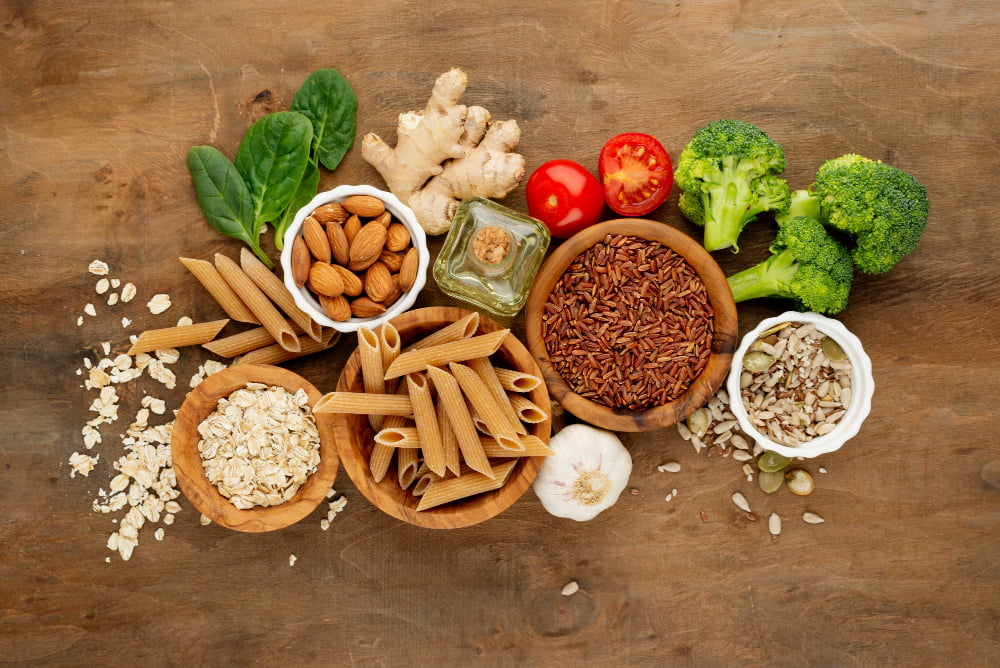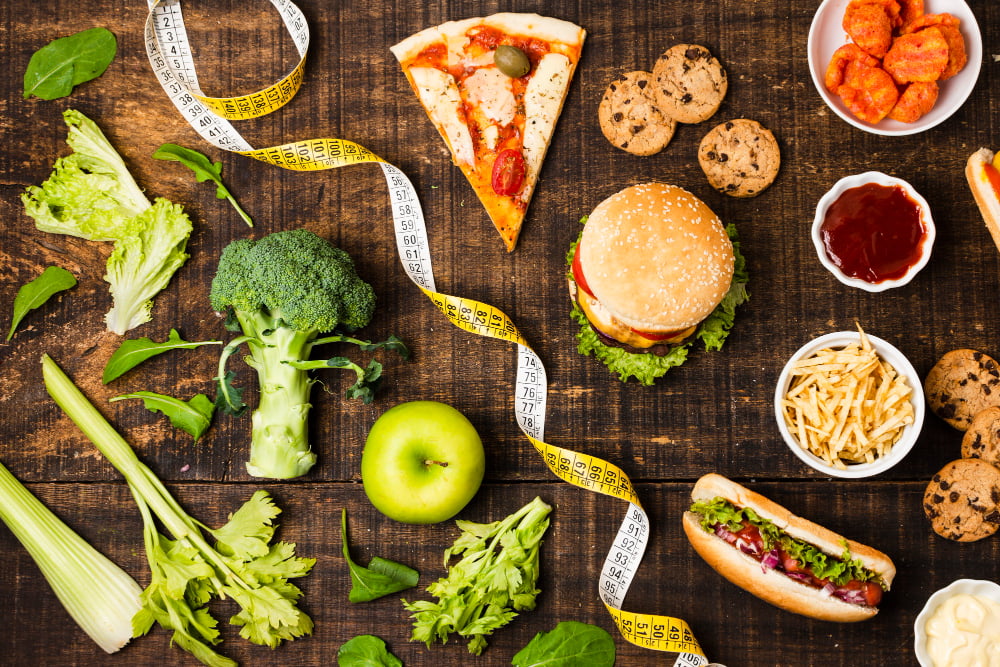Maintaining a healthy diet is essential for weight loss. By incorporating certain foods into your meals, you can accelerate your weight loss journey. In this article, we will explore 10 healthy diet foods that can help you shed those extra pounds. From protein-rich options to fiber-filled choices and metabolism-boosting superfoods, these foods will not only aid in weight loss but also provide essential nutrients for overall well-being.
Key Takeaways
- Incorporate lean meats, plant-based protein sources, and Greek yogurt into your diet for muscle building and weight loss.
- Include whole grains, legumes, and leafy greens in your meals for their fiber-rich properties that promote satiety.
- Healthy fats like avocado, nuts, and seeds can aid in weight loss and provide essential nutrients.
- Superfoods such as berries, green tea, and spices/herbs can boost metabolism and aid in weight loss.
- By including these 10 healthy diet foods in your meals, you can accelerate your weight loss journey and improve your overall health.
The Power of Protein

Lean Meats for Muscle Building
Lean meats are an excellent source of protein, which is essential for muscle building and repair. Chicken breast is a popular choice among fitness enthusiasts due to its high protein content and low fat content. Other lean meats such as turkey, lean beef, and pork tenderloin are also great options. These meats not only provide the necessary amino acids for muscle growth but also help in maintaining a healthy weight.
When choosing lean meats, it’s important to opt for cuts that are low in saturated fat. Trim off any visible fat before cooking and opt for cooking methods like grilling, baking, or broiling to minimize added fats. Incorporating lean meats into your diet can help you achieve your weight loss goals while providing the necessary nutrients for muscle development.
Here are some examples of lean meats:
| Meat | Protein Content (per 100g) |
|---|---|
| Chicken Breast | 31g |
| Turkey Breast | 29g |
| Lean Beef | 26g |
| Pork Tenderloin | 23g |
Remember to always consult with a healthcare professional or registered dietitian before making any significant changes to your diet.
Plant-Based Protein Sources
Plant-based protein sources are a great option for those following a vegetarian or vegan diet. They provide essential amino acids and are rich in nutrients. Some popular plant-based protein sources include:
- Quinoa: Quinoa is a complete protein, meaning it contains all nine essential amino acids. It is also high in fiber and packed with vitamins and minerals.
- Lentils: Lentils are a versatile legume that can be used in a variety of dishes. They are high in protein, fiber, and iron.
- Chickpeas: Chickpeas, also known as garbanzo beans, are a staple in many cuisines. They are a good source of protein, fiber, and folate.
Including these plant-based protein sources in your diet can help you meet your protein needs while also providing other important nutrients. They can be incorporated into meals such as salads, stir-fries, and soups.
The Benefits of Greek Yogurt
Greek yogurt is a nutritious and versatile food that offers numerous health benefits. Protein is one of the key nutrients found in Greek yogurt, making it an excellent choice for those looking to build muscle. In addition to protein, Greek yogurt is also rich in calcium, which is essential for strong bones and teeth.
Greek yogurt is also a great source of probiotics, which are beneficial bacteria that support a healthy gut. These probiotics can help improve digestion and boost the immune system. Additionally, Greek yogurt is low in calories and fat, making it a suitable option for those trying to lose weight.
To incorporate Greek yogurt into your diet, you can enjoy it on its own or use it as a substitute for sour cream or mayonnaise in recipes. It can also be added to smoothies, used as a topping for granola or fruit, or mixed with herbs and spices to create a flavorful dip or dressing.
In summary, Greek yogurt is a nutrient-dense food that provides protein, calcium, and probiotics. It is a versatile ingredient that can be enjoyed in various ways and is beneficial for muscle building, digestion, and weight loss.
Fiber-Rich Foods for Satiety

Whole Grains for Long-Lasting Energy
Whole grains are an excellent source of long-lasting energy. They are rich in complex carbohydrates, which are digested slowly, providing a steady release of energy throughout the day. Oats are a popular whole grain that is not only nutritious but also versatile. They can be enjoyed as oatmeal for breakfast or used in baking recipes. Other examples of whole grains include quinoa, brown rice, and whole wheat bread.
Including whole grains in your diet can help you feel fuller for longer and prevent energy crashes. They are also packed with essential nutrients like fiber, vitamins, and minerals. Here are some ways to incorporate whole grains into your meals:
- Start your day with a bowl of oatmeal topped with fresh fruits and nuts.
- Swap white rice with brown rice in your stir-fries and pilafs.
- Choose whole wheat bread or wraps for your sandwiches and wraps.
Remember to read food labels carefully to ensure you are choosing products that are made with whole grains and not refined grains.
Adding whole grains to your diet is a simple and effective way to boost your energy levels and support your weight loss goals.
Legumes for Gut Health
Legumes are a great addition to a healthy diet, especially when it comes to promoting gut health. These nutrient-packed foods are rich in fiber, which helps to support a healthy digestive system. Beans, lentils, and chickpeas are all excellent sources of fiber, providing both soluble and insoluble fiber that can help to regulate bowel movements and prevent constipation.
In addition to their fiber content, legumes also contain beneficial compounds called prebiotics. Prebiotics act as food for the beneficial bacteria in our gut, helping them to thrive and support overall gut health. Including legumes in your diet can help to promote a diverse and healthy gut microbiome.
To incorporate more legumes into your diet, try adding them to soups, salads, or stir-fries. You can also use them as a base for vegetarian dishes, such as bean burgers or lentil curry. Experiment with different types of legumes to find your favorites and enjoy the many health benefits they provide.
The Importance of Leafy Greens
Leafy greens are an essential part of a healthy diet. They are packed with nutrients like vitamin K, vitamin C, and folate that are important for overall health. These greens also provide a good amount of fiber, which aids in digestion and helps to keep you feeling full.
Including leafy greens in your diet can have numerous benefits. They are low in calories and high in water content, making them a great choice for weight loss. Leafy greens also contain antioxidants that help to protect against chronic diseases.
To incorporate more leafy greens into your diet, you can try adding them to salads, smoothies, or stir-fries. You can also use them as a base for wraps or sandwiches instead of bread.
Remember to wash your leafy greens thoroughly before consuming them to remove any dirt or pesticides. Enjoy the many health benefits that leafy greens have to offer!
Healthy Fats for Weight Loss

Avocado: The Superfood
Avocado is a true superfood that offers a wide range of health benefits. Rich in healthy fats, avocados are a great addition to any weight loss diet. They are also packed with fiber, which helps promote feelings of fullness and aids in digestion.
In addition to being a nutrient-dense food, avocados are also a good source of vitamins and minerals. They contain vitamins C, E, K, and B-6, as well as folate, magnesium, and potassium. These nutrients are essential for overall health and can support weight loss efforts.
To incorporate avocados into your diet, try adding them to salads, sandwiches, or smoothies. You can also use them as a substitute for butter or mayonnaise in recipes. With their creamy texture and delicious taste, avocados are a versatile and nutritious addition to any meal.
Nuts and Seeds for Nutrient Boost
Nuts and seeds are not only delicious but also packed with essential nutrients. They are a great source of healthy fats, protein, fiber, vitamins, and minerals. Incorporating nuts and seeds into your diet can provide numerous health benefits, including:
- Improved heart health: Nuts and seeds are rich in monounsaturated and polyunsaturated fats, which can help lower bad cholesterol levels and reduce the risk of heart disease.
- Enhanced brain function: The omega-3 fatty acids found in nuts and seeds are beneficial for brain health and cognitive function.
- Weight management: Despite their high calorie content, nuts and seeds can actually aid in weight loss. The combination of protein, fiber, and healthy fats helps promote feelings of fullness and reduce cravings.
Including a variety of nuts and seeds in your meals and snacks is a simple and delicious way to boost your nutrient intake and support overall health.
Omega-3 Rich Foods for Heart Health
Omega-3 fatty acids are essential for maintaining a healthy heart. These beneficial fats have been shown to reduce the risk of heart disease and improve overall cardiovascular health. Incorporating omega-3 rich foods into your diet can have numerous benefits. Some of the best sources of omega-3 fatty acids include:
- Fatty fish such as salmon, mackerel, and sardines
- Flaxseeds and chia seeds
- Walnuts and almonds
Including these foods in your diet can help lower blood pressure, reduce inflammation, and improve cholesterol levels. It is recommended to consume at least two servings of fatty fish per week to ensure an adequate intake of omega-3 fatty acids.
Tip: To maximize the benefits of omega-3 fatty acids, opt for grilled or baked fish instead of fried options.
Superfoods for Accelerated Metabolism

Berries: Nature’s Antioxidant Powerhouse
Berries are a delicious and nutritious addition to any diet. They are packed with antioxidants, which help protect the body against damage from harmful free radicals. Blueberries, in particular, are known for their high antioxidant content. They are also rich in vitamins and minerals, making them a great choice for overall health.
In addition to their antioxidant properties, berries are also low in calories and high in fiber. This combination makes them an excellent choice for weight loss. The fiber in berries helps to keep you feeling full and satisfied, while the low calorie content allows you to enjoy them without worrying about excess calories.
To incorporate more berries into your diet, try adding them to your morning oatmeal or yogurt, blending them into smoothies, or enjoying them as a snack on their own. With their sweet taste and numerous health benefits, berries are a fantastic addition to any weight loss plan.
Green Tea for Increased Fat Burning
Green tea is a popular beverage that has been associated with numerous health benefits. One of its key benefits is its ability to increase fat burning. The catechins found in green tea have been shown to boost metabolism and increase the body’s ability to burn fat.
Studies have found that drinking green tea can help increase the rate at which the body burns calories. This can lead to greater weight loss and a reduction in body fat percentage.
In addition to its fat-burning properties, green tea is also rich in antioxidants, which can help protect against oxidative stress and inflammation.
To incorporate green tea into your diet, try swapping out your regular cup of coffee for a cup of green tea in the morning. You can also enjoy it iced or add a squeeze of lemon for added flavor.
Remember, while green tea can be a helpful addition to a healthy diet, it’s important to also focus on overall lifestyle factors such as regular exercise and a balanced diet for optimal weight loss.
Spices and Herbs for Thermogenesis
Spices and herbs not only add flavor to your meals but can also help boost your metabolism. Cayenne pepper is one spice that has been shown to increase thermogenesis, the process of heat production in the body. This can lead to a temporary increase in calorie burning. Other herbs and spices like ginger and cinnamon may also have similar effects.
Incorporating these spices and herbs into your meals can be as simple as adding them to your favorite recipes. You can sprinkle cayenne pepper on roasted vegetables or add ginger and cinnamon to your morning smoothie. Experiment with different combinations to find flavors that you enjoy.
Here are some ways you can incorporate spices and herbs into your diet:
- Use cayenne pepper to spice up your soups, stews, and stir-fries.
- Add ginger to your tea or use it in marinades for meats and vegetables.
- Sprinkle cinnamon on your oatmeal, yogurt, or roasted sweet potatoes.
Remember, while spices and herbs can provide a small boost to your metabolism, they are not a magic solution for weight loss. It’s important to focus on overall healthy eating habits and regular physical activity for long-term weight management.
Conclusion
Incorporating these 10 healthy diet foods into your daily routine can greatly accelerate weight loss. By focusing on nutrient-dense options like fruits, vegetables, lean proteins, and whole grains, you can nourish your body while shedding excess pounds. Remember to stay consistent and make gradual changes to your eating habits for long-term success. Start your weight loss journey today and experience the benefits of a healthy diet!
Frequently Asked Questions
What is the role of protein in weight loss?
Protein helps build and repair tissues, boosts metabolism, and promotes satiety, making it an essential nutrient for weight loss.
Can I get enough protein from plant-based sources?
Yes, there are plenty of plant-based protein sources such as beans, lentils, tofu, tempeh, and quinoa that can provide all the essential amino acids your body needs.
Is Greek yogurt a good source of protein?
Yes, Greek yogurt is an excellent source of protein, containing about twice as much protein as regular yogurt. It also provides probiotics for gut health.
Why are fiber-rich foods important for weight loss?
Fiber-rich foods like whole grains, legumes, and leafy greens help promote satiety, regulate blood sugar levels, and support a healthy digestive system, aiding in weight loss.
How does avocado contribute to weight loss?
Avocado is a healthy fat that is rich in monounsaturated fats, which can help reduce appetite, increase feelings of fullness, and improve heart health, all of which support weight loss.
What are some omega-3 rich foods for weight loss?
Fatty fish like salmon, mackerel, and sardines are excellent sources of omega-3 fatty acids, which have been shown to reduce inflammation, improve insulin sensitivity, and support weight loss.






